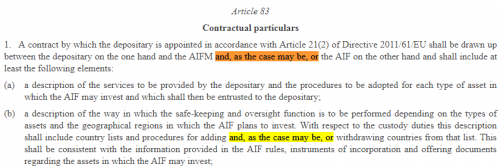And/or
|
Towards more picturesque speech™
|
And/or is the lawyer’s equivalent of a damp kipper handshake. Avoid it.
“And/or” means “or”, because “or” includes “and”.
That’s it.
In tedious detail
“And/or” has a face only a mother could love. It is borne of the fear that, when considering alternatives any of which leads to a given outcome, things might somehow be different if they all occur.
There is no grounds for this fear. Logically, this is how one defines and and or:
- “And” is a logical operator which gives the value one if and only if all the operands are one, and otherwise has a value of zero.
- “Or” is a logical operation which gives the value one if at least one operand has the value one, and otherwise gives a value of zero.
Besides, and/or is not just ugly; it’s circular. It presents as a paradox, because of that slash. Now the slash is not a part of idiomatic punctuation in the English language. It’s a decoration with no fixed grammatical meaning. To use a slash in legal writing is to confess that the ordinary, punctuated words of the English language have defeated you.
In “and/or”, that slash means — can only mean — “or”. So by saying “and/or” you are really saying “and, or or”. But to be hermetically sealed and consistent, shouldn’t you make one further clarifying step, and say “and, and/or or”?
AND DO YOU NOW SEE THE INFINITE REGRESSION YOU HAVE SET IN MOTION?
Go back to your draft and strike all examples, and we shall never speak of this again.
See also
Plain English Anatomy™ Noun | Verb | Adjective | Adverb | Preposition | Conjunction | Latin | Germany | Flannel | Legal triplicate | Nominalisation | Murder your darlings
